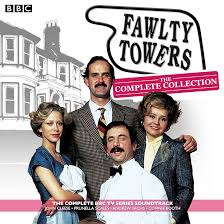The Enduring Legacy of Fawlty Towers

Introduction
Fawlty Towers, a British television sitcom created by John Cleese and Connie Booth, first aired in 1975, quickly becoming a cornerstone of British comedy. Its blend of sharp humour, memorable characters, and clever writing set a new standard for sitcoms and has left a lasting impact on the genre. As the show celebrates its 48th anniversary, its relevance in today’s cultural landscape continues to resonate, making it a topic worth exploring.
Overview of Fawlty Towers
The show is set in a dysfunctional hotel run by the rude and incompetent Basil Fawlty, played by John Cleese, along with his domineering wife, Sybil, and their sometimes-inept staff. Despite airing only two series with a total of 12 episodes, Fawlty Towers has been lauded for its brilliant character dynamics, tight plots, and timeless humour, making it a favourite among audiences of all ages.
Critical Acclaim and Awards
Fawlty Towers has accrued numerous accolades over the years, including BAFTA awards and a spot in the British Film Institute’s list of the 100 Greatest British Television Programmes. Its clever writing and standout performances, particularly by Cleese and Prunella Scales (Sybil), have earned it critical acclaim and cemented its legacy as one of the greatest sitcoms of all time.
Modern Influence
In recent years, the influence of Fawlty Towers can be seen across various media, with countless references and homages in popular culture. New generations of comedians cite it as a significant inspiration for their work, and its comedic style can be traced in several contemporary television programmes. The show’s humour, based on misunderstandings and character flaws, continues to resonate, showcasing the universal themes of human nature.
The Future of Fawlty Towers
As discussions about the possibility of a Fawlty Towers revival circulate in the media, fans eagerly anticipate how the original format might be adapted to fit the current times. While there are concerns about how to capture the essence of the programme without losing its integrity, any new developments hold the potential to introduce this classic to a new audience while reinvigorating the legacy of the original series.
Conclusion
Fawlty Towers remains a benchmark of British humour, capturing the essence of farce in a way that still resonates today. Its critical acclaim and widespread influence in comedy underscore its importance not just as entertainment but as an enduring part of British cultural history. As a reminder of the comedy that can arise from flawed characters and awkward situations, Fawlty Towers assures that laughter will always have a place, no matter the era.









